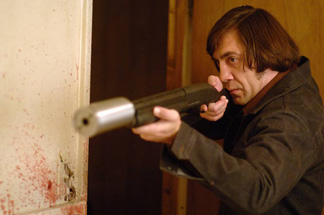Movie Review: No Country for Old Men
By Eric Hughes
March 20, 2008
BoxOfficeProphets.com

The plot is simple enough: a drug deal gone bust. By chance, retired welder Llewelyn Moss (Josh Brolin) happens upon the sum of money – $2 million to be exact – and goes on the run soon after his "lucky" find. Javier Bardem plays the haunting, machine-like Anton Chigurh, a serial killer who will stop at nothing to recover his stolen dough. Rounding out the main cast is Tommy Lee Jones as tired Texan sheriff Ed Tom Bell, charged with cleaning up the mess to the best of his ability.
The trio, in fact, all put in exceptional performances for their respective portrayals, especially Bardem as the mysterious Chigurh. Without a doubt, he understands the thought processes of the character, and executes a performance so villainous I was reminded of cinema's other renowned serial killer: Dr. Hannibal Lector. However, instead of intimidation through mind games, Chigurh simply uses brute force. In the end, the film's body count is staggeringly high.
McCarthy's story bodes well for the Coen brothers, who take full advantage of the solitary missions of the characters. Because Moss, Chigurh and Bell work only for themselves, dialogue is somewhat at a minimum here – though what is said is quite good. In lieu of speech, there is a heavy reliance on sounds – and more importantly, sound editing – which the Coen brothers have relentlessly proven they are masters of, like in 1996's Fargo. Perhaps the film's best scene is the silent showdown between Moss and Chigurh at a Texan hotel. No words are spoken between the pair. Instead, the Coen brothers paint the scene with creaking flood boards, missed telephone calls and a smattering of gun shots. It's gripping, haunting, and is arguably one of the best three minutes of film shot this year.
What I respect most about No Country for Old Men, though, is its untraditional approach in telling a rather familiar story. With a fresh perspective, you feel like (and are) watching an entirely new drama. Moss, the supposed protagonist, really isn't the film's "main" character. In fact, in the end his character really doesn't amount to much anything at all. Nor is the film's assumed thesis shoved down your throat from the onset of the picture. Instead, it develops throughout the course of the film's runtime, reaching its climax through an untraditional path (for No Country for Old Men, at least): conversation. Nor does it end in the traditional Hollywood way. And yet, you are left feeling more than satisfied.
Any film reviewer would be hesitant to say it, but No Country for Old Men is the best of the year, the Coen brothers' best to date and is nothing short of a masterpiece.